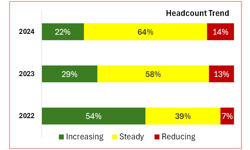The statement on the Royal Mail website says:
The operating profit in the first half of the 2010-11 financial year represented a return of just over 1% on Group-wide revenues of £4.4 billion.
The Letters business of the Group moved from operating profit to loss during the first half of the year with letter volumes falling to an average daily postbag of 68 million items - 16 million fewer than the average daily volume just five years ago, when volumes peaked. The average postbag is now at levels last seen in the mid 1990s
Key performance figures - six months ended 26 September 2010
The fall in mail volumes was by far the single biggest factor behind the drop in Group revenues. Revenues fell by significantly more than the operating profit fall - demonstrating that the modernisation of operations with new technology and more efficient working practices is having a positive impact but also underlining the crucial need to step up the pace of transformation.
First and Second Class mail, Standard parcels and key business mail services are beating their targets according to the latest preliminary figures with the company determined to strengthen yet further its focus on delivering excellent customer service.
Moya Greene, Royal Mail Group’s Chief Executive Officer, said: "Trading conditions over the last six months have been exceptionally tough. I pay tribute to our frontline employees for the way they are getting on with the essential modernisation changes we are introducing. But with widespread predictions in the postal world that mail volumes will continue falling, perhaps by up to 40% over the next five years in the UK, it’s absolutely vital we step up the pace of modernisation to become more efficient to ensure we preserve the all-important, one-price-goes-everywhere Universal Service for all our customers and keep providing the services our customers need and want."
Revenues fell in the Post Office business with a further fall in traditional business, including benefit payments via the Post Office Card Account, while revenues from other services, including foreign currency and telephony dipped. However, the very recent Government announcement of a £1.3 billion funding package for the next four years to maintain and modernise the Post Office network is great news that we warmly welcome.
The Group’s other two businesses, Parcelforce Worldwide and GLS, the European parcels business, both increased their operating profits in the first half of the year, despite intensifying competition in their markets, and both are leaders in their markets for customer service.
Ms Greene said: "Both these businesses are unregulated, showing what we can achieve when we are allowed to compete fairly - which is why we are saying that the heavy regulation suffocating Royal Mail in the competitive market in which it operates should be lifted as soon as possible."
The results for the first six months of the financial year also showed a further increase - up 13% - in "access" mail which has been collected from business customers by Royal Mail rivals but delivered by Royal Mail’s postmen and women. The accounts for last year, 2009-10, showed Royal Mail losing an average of 2.5p on access mail, which accounts for more than one in three of all letters delivered by Royal Mail. Ms Greene said: "We need to end what is, in effect, a very substantial built-in subsidy from Royal Mail to its rivals."
She added that a huge effort was underway to tackle the Group’s heavy underlying negative cashflow, including a special request to the regulator, Postcomm, for fair bulk business mail prices.
Chairman’s Statement
"A tough six months - but confidence for the future"
The first half of 2010-11 has seen some major events in the development of Royal Mail Group. First, I am delighted to report that our new Chief Executive Officer, Moya Greene, has taken up the reins with vigour; and second, that the Government has published the Postal Services Bill aimed at opening the way for the Group to gain access to private capital and proposing actions in relation to the pension fund deficit and the removal of regulation where there is competition.
Moya joined at a time of tough trading. Royal Mail Group’s core business faced increased competition in a difficult economic environment in the first half of 2010-11. Margin pressure added to the difficult trading conditions. Plans and processes are in place to meet the challenges we face as we continue to modernise operations to ensure a strong future for the business. Real progress has been made towards a transformation of the operations in our business.
Despite revenue falling from £4,575 million to £4,402 million the Group remained profitable at an operating level. Operating profit was £52 million, against a comparable performance of £184 million last year. The fall in operating profit (£132 million) was significantly lower than the fall in revenue (£173 million), showing improvement in our performance as we continue our modernisation programme. Revenue was impacted by a further decline in mail volumes in a highly competitive market. However, the benefits of efficiency gains in the Royal Mail Letters business from further progress in modernisation helped offset some of the impact from lost revenue from volume decline. Group profit was further impacted by a reduction in operating profit in Post Office Limited - down to £20 million from £41 million at the previous half year. Revenues from Government services in Post Office branches declined further and sales of financial service products remained difficult, however, the very recent Government announcement of a £1.3 billion funding package for the next four years to maintain and modernise the Post Office Network is great news that we warmly welcome. Despite difficult trading conditions in its highly competitive and unregulated market, Parcelforce Worldwide achieved growth in both revenue and operating profit. Operating profit in the Group’s European parcels business, GLS, also improved. In all businesses, cost control has been an important ingredient of performance.
The Group continues to have negative cashflow - £229 million in the first six months as a consequence of continuing investment in modernisation. The Group remains steadfast in its determination to modernise so that we can be more responsive to customers and to their changing needs, and at the same time achieve the necessary cost reductions. Moya is leading a programme of self-help in all areas of the business.
Despite all the headwinds, customer quality of service in the Letters business has further improved and key services, including First Class mail, are being delivered above target.
Changes to strengthen the Board
I am pleased to report that the Board has been further strengthened. Matthew Lester joins the Board in November as Group Finance Director from ICAP plc, replacing Ian Duncan. Recognising the increasing customer focus of the Group, Dave Smith has been appointed Chief Customer Officer. He has been succeeded as Managing Director of Post Office Limited by Paula Vennells, formerly Post Office Limited’s Chief Operating Officer, and I also welcome her as a new member of the Group Board.
In addition, Nick Horler, Cath Keers and Orna Ni-Chionna all joined the Board as Non-Executive Directors bringing regulated industry and customer insights to the governance of the Group.
Baroness Prosser retires from the Board in November after six years of service to the Group. Her background in industrial relations and interest in minority participation has been particularly valuable.
Pension funding
The Board warmly welcomes the measures in the Government’s Postal Services Bill to resolve the historic £10.3 billion actuarial pension fund deficit. The Bill has now received its Second Reading and continues its Parliamentary passage but until the measure becomes law and a solution is agreed and executed, the Company will continue to be responsible for payments to the pension fund to cover the deficit. Under the new funding payment schedule agreed between the Group and the Pension Plan Trustee in June 2010, the Company will - until relieved of the obligation by the Government - pay £282 million a year (rising in line with inflation) towards eliminating the deficit.
The future
I remain confident Royal Mail Group is effectively tackling the challenges it faces while continuing to focus on its customers and providing the Universal Service. The consensus in the postal world is that we can expect to see further falls in letter volumes, more business will migrate to the web and competition at all levels will further intensify. We are very determined to ensure that our core services - together with innovative products - will continue to ensure our businesses remain a central part of everyday life in the UK. Great progress has been made since the Company embarked on its renewal plan in 2002 and many then would not have believed that in less than a decade, the Group would have embraced new working practices and be using technology at every level of our operation in an efficient and customer-focused way.
We know we still have much to do but there is real momentum behind us as we continue to modernise and respond to the digital world around us.
Donald Brydon
Chairman
Royal Mail Group
2 November 2010
Chief Executive’s Statement
In the short time I have been at Royal Mail, I have been impressed by the commitment of its people and the way the entire Company is facing up to challenges posed by a rapidly changing market - the same challenges and uncertain future that face postal services across the globe.
The current climate is extraordinarily tough, with ever intensifying competition, falling mail volumes and adverse economic conditions. However, we are committed to working with our people to make modernisation work; ensuring that a passion for customers remains at the centre of everything we do; and innovating to serve our customers’ changing needs. Our World Class Mail programme is introducing entirely new ways of working to achieve world class standards in safety, productivity and quality. People are encouraged to be actively involved and share ideas on all aspects of their work, from workplace organisation to quality control to cost effectiveness. In Gatwick alone, accidents have been reduced by 88 per cent, while Cardiff has saved £1.5 million in 16 local World Class Mail projects.
However, it is clear that in light of the rapid and continuing contraction and change in the UK mails market and around the world, the pace of change has got to be accelerated. That is why the Company is going through a major restructure - so we have the right people, and the right number of people, in the right jobs - and why we have asked Postcomm for the ability next year to increase prices on business mail products over and above the levels allowed in the existing price control. What we are asking for is the chance to charge a fair price to other companies who use our network to carry mail, and to end what is in effect the very substantial built-in subsidy which our rivals have enjoyed for years.
The downturn and uncertainty in the mails market means that - without appropriate mitigating action - Royal Mail faces the prospect of cash headroom reaching a level which could represent a risk to a business of this scale with these cash outgoings. As the financial health of Royal Mail and the Universal Service are intimately linked, action must be taken to safeguard the financial sustainability of Royal Mail and the Universal Service.
Royal Mail had a £157 million operating loss after exceptional items last financial year, 2009-10, on "access" mail - the letters, packets and parcels collected by its rivals but delivered by Royal Mail. The loss amounted to an average of 2.5p per item for the 6.4 billion pieces of access mail delivered by Royal Mail, and access mail continues to grow. More than one in three of all letters delivered by Royal Mail is an access item of mail.
Royal Mail is implementing a package of measures to raise cash including reducing headcount, tightening spend with suppliers and raising proceeds from asset sales. But securing additional revenue is also an essential measure. We recognise the difficulty of raising extra revenues from prices in the current mails market. However price rises are one of several measures that are needed to address the potential short term cash position and Royal Mail does not intend to raise the additional earned revenue through the price of mail to single piece mail services - in other words Royal Mail will not increase 1st and 2nd class stamp prices beyond the level allowed in the current price control.
Finally, let me turn to the Postal Services Bill. I welcome the Government’s plans for deregulation of the postal services market and its intention to resolve the £10.3 billion historic pension deficit. I am also very pleased to see the package of proposals that allow Royal Mail flexible and timely access to capital in future as it continues to invest in modernisation.
Deregulation of the UK postal services market is long overdue and the Government has said it wants to ensure that the new regulatory framework is proportionate to the needs of the market and allow for rapid deregulation where there is competition. That is very good news because it is simply wrong that a suffocating regulatory approach should apply at all in a competitive market - and that it applies only to Royal Mail, which is the only company able to provide the Universal Service on which so many people depend.
Key commentary on the six months ended 26 September 2010:
• Royal Mail Letters (‘Letters’) moved from an operating profit last year to an operating loss of £66 million as mail volumes continued to decline - by a further 5% during the half year. The average daily postbag now contains 68 million letters, packets and parcels - 16 million lower than the peak daily volume of 84 million items in 2005, a fall of 24% in just five years as, like in other countries around the world, customers are using email, websites and, increasingly, social media for communications in place of the traditional letter. Competition from rival carriers, especially in the fiercely competitive packet and parcel market for delivery of goods ordered online, also further intensified.
• Revenue loss in the Letters business from declining mail volumes amounted to £188 million although this was partially offset by price rises in April 2010 yielding an additional £52 million over the six month period. Belt tightening by customers further depressed revenues with downtrading to lower priced products and services while a 13% increase in access mail handled by rivals meant that the average income the Letters business received per item of mail fell by 1p compared to the position a year ago.
• Further progress was made in modernising the Letters business. A huge positive effort by both the Letters business and the CWU has gone into implementing the three-year agreement between the business and the union - Business Transformation, 2010 and Beyond - and I pay tribute to our frontline people for the scale of the changes they are undertaking. A key challenge, however, is to step up the pace of the modernisation to earn more swiftly further benefits from efficiency savings on top of the cost reductions we have already seen.
• Postmen and women are delivering First and Second Class mail ahead of target, according to the latest preliminary figures from independent measurement, as well as Mailsort bulk mail services and Standard Parcels. We are determined to increase our focus on customers yet further.
• The number of UK employees in the Group fell by 2,800 in the first six months, the large majority in the Letters business. Job numbers have been falling for eight consecutive years and we can expect further losses as we seek further efficiencies and adopt new working practices. A programme to reduce non-operational jobs in support functions is already underway.
• Post Office Limited saw further decline in its core businesses driven mainly by a reduction in income earned from the DWP on the Post Office Card Account. The loss in revenue from this business - as well as reduction in footfall from fewer visits to Post Offices - has been accompanied by falling revenues in newer products, including foreign currency and travel insurance - which both competed in a tough market in what has been a testing period for the wider travel industry - and Post Office HomePhone revenues also dipped as people made fewer calls on fixed line telephones.
• Parcelforce Worldwide’s focus on first-time delivery - its performance of 96.7% is comfortably above the industry norm - along with customer quality of service helped drive a further increase in the business’ revenues - up 3% in what remains an intensely competitive market for packets and parcels. Profits also rose by 14% - up £1 million to £8 million comparing this half year to the last.
• GLS, Royal Mail Group’s European parcels business delivering more than 1.3 million parcels each working day in 36 European states, made a £51 million operating profit - up 13% compared to the same period last year. Its reported revenues fell as a result of the weakening of the euro against sterling but when the impact of currency exchange was removed, the underlying picture showed a revenue growth of 2%, despite operating, like the rest of the Group, in an exceptionally difficult and competitive market.
• A number of steps have been taken to address the underlying negative cashflow including drawing down a further net £235 million at commercial interest rates from the existing loan facility agreed with the Shareholder in 2007 - the money will, of course, have to be repaid - and selling property and leasing it back. Royal Mail also had the one-off benefit of £71 million from the sale of the Group’s stake in Camelot plc.
Moya Greene
Chief Executive Officer
Royal Mail Group
2 November 2010










